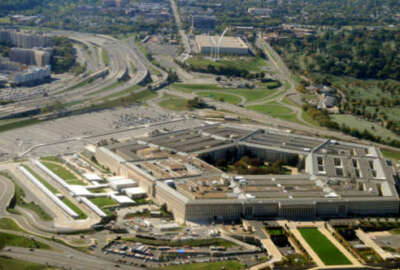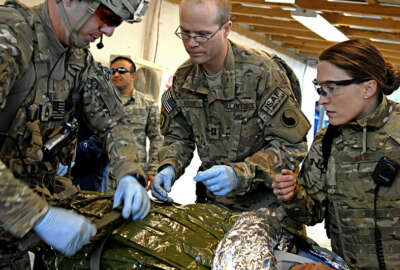
As Pentagon gears up for more teleworkers, IT network is already strained
The Defense Department is preparing for more of its Pentagon workforce to become teleworkers. But those who are already working from home have already begun to ...
Best listening experience is on Chrome, Firefox or Safari. Subscribe to Federal Drive’s daily audio interviews on Apple Podcasts or PodcastOne.
The Pentagon is still trying to get a handle on how many of its employees in the national capital region (NCR) might be able to telework as the coronavirus pandemic continues to worsen. But those who have started doing so are already beginning to put a strain on the Defense Department’s internet infrastructure.
Because of that, officials said they have already started throttling back the amount of bandwidth available for connections to public websites that consume large amounts of data, such as video streaming services. And the department planned to completely block access to YouTube by Monday night.
“Given the increased telework demand, we’ve seen a tremendous increase on the network — unprecedented demand just over the last weekend or so,” Essye Miller, the principal deputy DoD chief information officer said Monday during a virtual town hall for D.C.-area Defense employees. “We’re also seeing increased use of things like Pandora and other streaming music services, so we ask that if the use of these services is not mission-essential, that you refrain from using them on the DoD network.”
Miller said the increase in telework had already prompted a 240% increase in call volume to the helpdesk run by the Joint Service Provider, the Defense Information Systems Agency component that delivers networking and IT services to DoD offices in the NCR.
And more users are expected to join the ranks of those who are teleworking in the coming days and weeks. Right now, the department is asking managers to help categorize those potential new teleworkers into three groups: Those who can get by with only access to email, those who also need to access file servers on DoD’s internal networks, and those whose jobs require access to all of the IT resources they’d normally have in their government offices.
The coming increase in teleworkers is partly spurred by guidance from the Office of Management and Budget, issued Sunday evening, that told agencies in the national capital region to extend “maximum telework flexibilities” to employees.
Read more: Defense News
But Pentagon officials said decisions about precisely who would be authorized to telework would have to be made case-by-case, office-by-office.
“Our team members are working 24/7 to ensure you have the most current and relevant information available for you to make decisions, with your supervisor, about your workplace, your workstation, your ability to telework, your eligibility to telework, and your capability to telework based on your equipment and your particular mission,” said Thomas Muir, the director of DoD’s Washington Headquarters Services. “Many of us require secret or top-secret access to many of our classified systems to conduct our daily business. That obviously is not available at your home.”
The situation is also unclear for many of DoD’s contractor employees.
According to a WHS factsheet on the impact of coronavirus on contract workers assigned to DoD facilities, teleworking generally is not allowed unless it’s specifically provided for in their employer’s contract with the department.
In order to change that, the Pentagon would need to modify the contract.
“The contracting officer representative (COR) can contact the contracting officer to initiate a contract modification. The contracting officer will review the scope of the change and negotiate the modification with the contractor,” according to the guidance. “This change may incur additional costs to the government, so it is necessary that only the contracting officer coordinates this change.”
However, if DoD offices where contractors need access in order to do their jobs begin to close, contracting officers might have to issue stop-work orders.
On Sunday, Defense officials set the “health protection condition” (HPCON) for the Pentagon reservation — which includes the Pentagon itself, the nearby Mark Center, and leased offices in northern Virginia — to level B, the third most serious in a system that ranges from “0” to “D.”
Read more: Workforce News
Under HPCON BRAVO, Defense offices in the capital region are supposed to cancel all non-essential in-person meetings, limit even those that do happen to six people in a particular room and use teleconferencing technologies as much as possible.
But Miller emphasized that the department wants DoD organizations to use the chat and collaboration services provided by the Defense Information Systems Agency, not commercial ones that could be categorized as grey IT.
“We ask that you not resort to creative means — a la services that we have not approved for use on the network,” she said. “They will ultimately create holes and establish unnecessary security postures for us.”
And the department is reminding Defense workers that whenever they work from home, they should take exactly the same cybersecurity precautions they’ve been trained to use while they’re in the office.
“With the increased telework capability comes an increased attack surface for our adversary,” Miller said. “They’ve already taken advantage of the situation and the environment that we have on hand. With that, we’re developing good best practices for you to use as you move from working in the office into a telework environment.”
Copyright © 2024 Federal News Network. All rights reserved. This website is not intended for users located within the European Economic Area.
Jared Serbu is deputy editor of Federal News Network and reports on the Defense Department’s contracting, legislative, workforce and IT issues.
Follow @jserbuWFED






